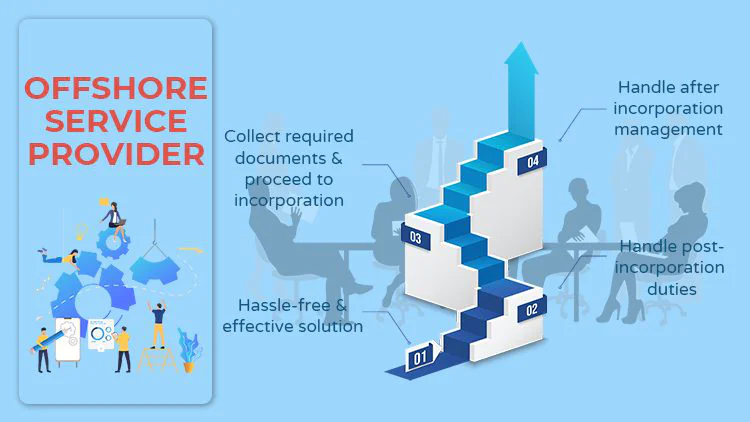Professional Offshore Company Monitoring
With globalization and the boosting importance of global business, more companies are exploring the advantages of developing and managing overseas entities. In this conversation, we will certainly explore the advantages of offshore firm administration, vital considerations for offshore operations, and reliable techniques to make sure conformity and lessen dangers.

Benefits of Offshore Company Management
There are several substantial benefits to offshore business administration that can greatly benefit services looking for worldwide growth and economic optimization. Offshore jurisdictions frequently provide favorable tax regimens, including reduced or zero corporate taxes, reduced funding gains taxes, and exceptions from certain taxes on rewards and rate of interest.
Offshore company management permits businesses to keep a higher degree of privacy and confidentiality in their economic events. Offshore jurisdictions usually have rigorous regulations and regulations in place to protect the identification of company owners and investors, making it tough for 3rd events to accessibility delicate info.
Moreover, overseas business monitoring uses businesses the possibility to access a global market. By establishing an offshore presence, firms can broaden their reach and take advantage of brand-new markets without the requirement for significant physical framework or facility prices. This adaptability enables companies to promptly adapt to transforming market problems and make the most of brand-new growth possibilities.
Secret Considerations for Offshore Operations
One essential facet to contemplate when participating in overseas company monitoring is the cautious consideration of vital variables for effective offshore operations. These factors to consider play an essential role in making sure the smooth performance and earnings of the overseas venture. It is crucial to evaluate the financial and political stability of the offshore jurisdiction. Spending in a financially flourishing and politically stable territory lowers the danger of abrupt policy modifications or financial slumps that might adversely affect the business. Furthermore, recognizing the legal structure and governing setting of the offshore jurisdiction is essential. Different territories have differing levels of regulative demands and compliance requirements. It is essential to guarantee that the selected territory lines up with the company's goals and purposes. One more key consideration is the accessibility of a dependable and proficient workforce. Offshore operations need a competent workforce that can effectively take care of the everyday procedures and contribute to the growth of business. The framework and technological abilities of the offshore jurisdiction must be assessed. Ample framework and access to sophisticated technology are essential for effective operations. Taking into consideration the tax implications and incentives supplied by the overseas jurisdiction is vital - formation of offshore companies. A desirable tax program can offer considerable expense savings and improve the overall success of the overseas endeavor. By very carefully taking into consideration these vital factors, firms can optimize their overseas operations and attain long-term success.
Ensuring Conformity With Local Rules
To ensure conformity with local policies, business involving in offshore operations have to extensively stick and comprehend to the certain legal demands and regulatory structure of the offshore jurisdiction. Offshore jurisdictions normally have their own set of laws and regulations that control different aspects of service procedures, consisting of firm formation, taxation, employment, and monetary reporting. It is important for companies to familiarize themselves with these laws to prevent potential lawful problems and charges.
Among the initial steps in making sure conformity is carrying out detailed study on the lawful and regulatory landscape of the picked overseas territory - formation of offshore companies. This involves researching the neighborhood regulations, recognizing the requirements for business enrollment and licensing, and determining any kind of specific laws that might apply to additional hints the firm's industry or company tasks

As soon as the legal requirements are comprehended, business must take proactive steps to follow them. This includes obtaining the necessary licenses, licenses, and authorizations prior to commencing procedures, and guaranteeing continuous compliance with tax and reporting responsibilities. It is also essential to remain upgraded with any type of changes or modifications to the policies in order to stay certified.
To facilitate compliance, companies may think about engaging the solutions of neighborhood lawful and accounting specialists that are skilled in the overseas jurisdiction's regulations. These specialists can offer advice and help in navigating the complicated legal landscape, helping companies to stay clear of conformity mistakes and make sure smooth procedures.
Tax Obligation Planning Techniques for Offshore Companies
Effective tax obligation planning is essential for offshore services to maximize their look these up tax obligation liabilities and optimize their economic effectiveness. Offshore organizations often have the advantage of undergoing desirable tax obligation programs, which can considerably decrease their tax obligation concern. To fully profit from these advantages, it is critical to create efficient tax preparation approaches.
One usual tax obligation planning method for overseas businesses is making use of tax obligation treaties. These treaties are arrangements in between nations that intend to avoid dual taxation and provide tax relief for businesses running in multiple territories (formation of offshore companies). By making use of these treaties, offshore organizations can lessen their tax obligation responsibilities and ensure that they are not paying tax obligations on the very same revenue in numerous nations
An additional approach is establishing a tax-efficient company structure. This involves developing a holding business in a browse this site tax-friendly jurisdiction and structuring business procedures in such a way that decreases tax obligation commitments. By thoroughly planning the ownership and control of the overseas company, it is feasible to reduce taxes on profits, dividends, and funding gains.
Additionally, offshore businesses can engage in transfer pricing approaches to optimize their tax setting. Transfer rates entails determining the prices at which goods, services, and intellectual property are transferred between associated entities within the exact same multinational team. By establishing transfer costs at an ideal degree, offshore companies can designate profits to low-tax jurisdictions, reducing their total tax obligation obligation.
Minimizing Risks in Offshore Operations
Offshore organizations must focus on lessening risks in their operations to make certain lasting success and monetary stability. Operating in an offshore jurisdiction provides unique difficulties and uncertainties that need careful monitoring. To effectively minimize risks, offshore services ought to adopt a positive strategy by implementing durable threat management approaches.
One secret aspect of risk minimization is carrying out thorough due diligence prior to engaging in any offshore transactions or collaborations. This involves investigating and validating the credibility, financial stability, and lawful conformity of possible company companions or service providers. By extensively vetting these entities, overseas organizations can lower the threat of fraudulent activities or association with immoral operations.
Additionally, overseas companies must implement comprehensive interior control systems to find and protect against any kind of potential illegal activities within the company. This includes establishing clear plans and procedures, partition of tasks, routine tracking, and internal audits. By preserving a durable interior control structure, offshore organizations can mitigate the risk of interior fraudulence and unauthorized tasks.
Furthermore, offshore organizations need to focus on conformity with global laws and anti-money laundering (AML) actions. Staying up-to-date with evolving governing requirements and carrying out effective AML procedures can decrease the danger of legal repercussions and reputational damage.
Finally, overseas businesses need to consider getting appropriate insurance policy coverage to shield versus unforeseen events such as natural calamities, political instability, or legal disagreements. Insurance coverage tailored to offshore procedures can provide economic compensation and assistance throughout times of situation, making sure the connection of company tasks.

Verdict
To conclude, overseas business administration supplies different advantages such as tax obligation planning approaches, reducing threats, and ensuring conformity with neighborhood guidelines. It is important for companies to carefully think about vital aspects for overseas procedures and browse the intricacies of different territories. By implementing reliable administration strategies and staying updated with regional laws, companies can successfully operate offshore and reap the benefits of international business possibilities.
In this conversation, we will certainly explore the advantages of overseas business management, key factors to consider for overseas procedures, and reliable strategies to make certain compliance and lessen dangers.One crucial element to ponder when engaging in offshore business administration is the cautious factor to consider of essential elements for effective overseas procedures.To make sure conformity with regional guidelines, companies engaging in offshore procedures must thoroughly understand and stick to the particular legal requirements and governing structure of the overseas territory. Offshore territories normally have their own set of regulations and guidelines that regulate various facets of service procedures, including company formation, taxation, work, and economic reporting. By carrying out reliable administration approaches and staying updated with regional policies, companies can successfully run offshore and reap the benefits of worldwide service opportunities.